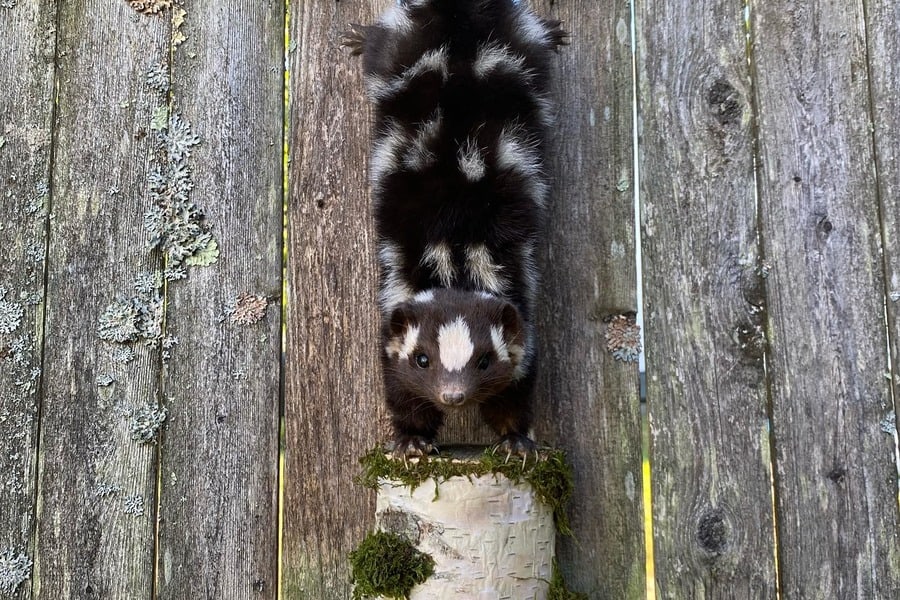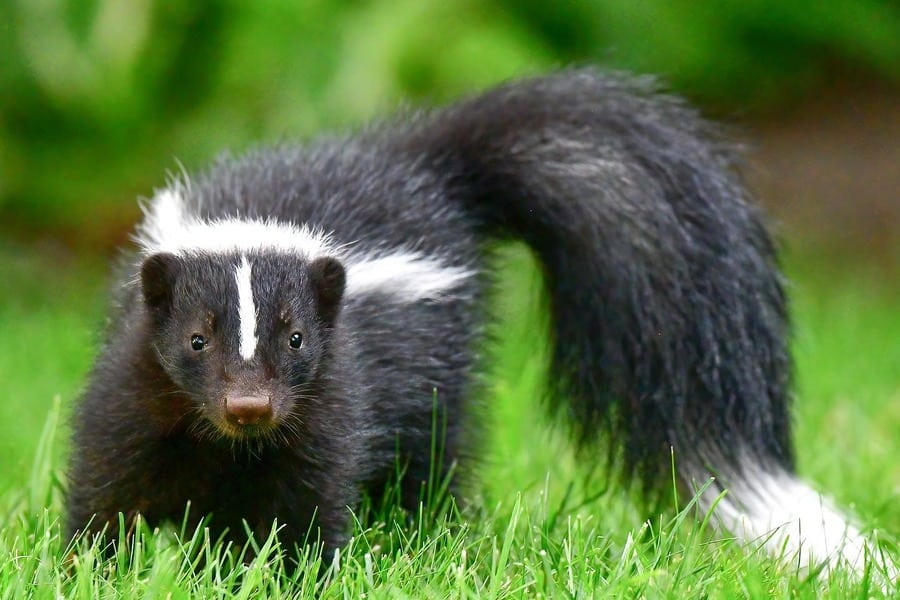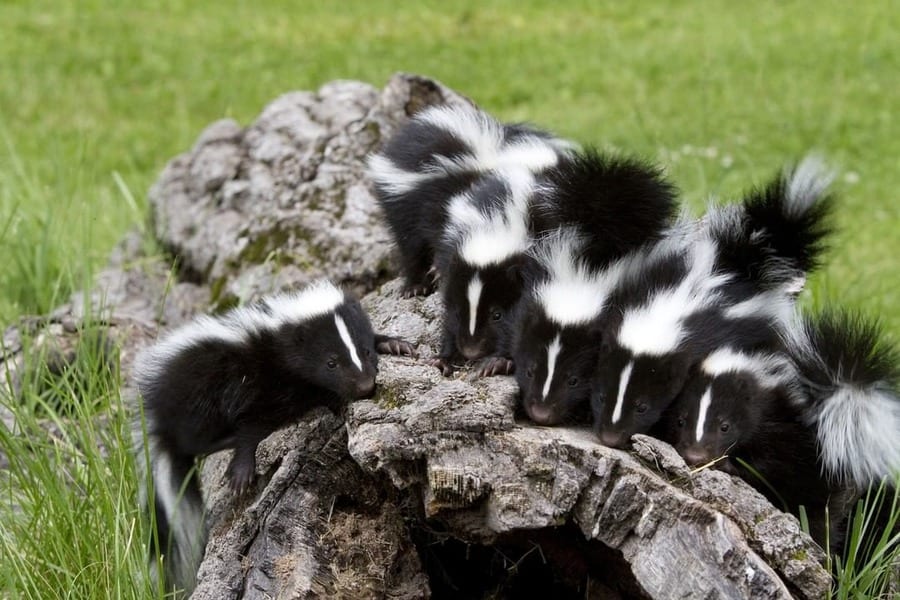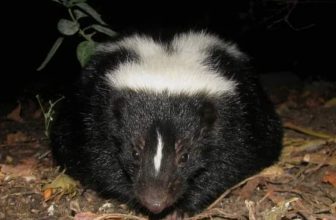You may think your home is a fortress and protected from unwanted guests. But one day, you see a skunk in your yard and wonder how it got into your property. In this article, I will tell you how skunks overcome barriers and what additional measures you should take to protect your yard from these persistent animals. Can skunks climb a fence? Keep reading to find out the truth!
Not all skunk species can climb over a fence, and knowing their abilities can help protect your garden. You can also cover all openings to prevent a skunk from settling under the house foundation. Adding some odor-preventing substances to your garden will also prevent skunks.
Can Skunks Climb a Fence?
In fact, skunks are not animals that are adept at climbing trees, fences, and so on. Nature has endowed them with massive claws, so their main occupation is digging. But this is more true of the skunk when it is at rest. If the animal gets into a stressful situation, its behavior changes dramatically. For example, when a skunk feels in danger, it can quickly climb a tree or overcome any obstacle that is in its way. He can climb wood fences, netting, etc.
Also, if the skunk smells that there is something edible for him in your yard, he may try to dig a hole under the fence. If a skunk cannot do that for some reason, it will do everything to climb over the barrier and end up in your yard.
Skunk Species That Can’t Climb Fence
Of course, that does not apply to absolutely all skunks. Because its weight and size affect the ability of each skunk species, some of these animals are indeed able to climb trees. But some cannot do so because of their large size or powerful claws. Let’s look at the most pluvial skunk species encountered in the U.S. and learn about their abilities.
Striped skunk
The striped skunk is the most common species in the United States. It is quite large, ranging from 18 to 32 inches. An adult skunk can weigh up to 13 pounds. It is easy to recognize by its characteristic color. The animal is black and has 2 white stripes on its back, forming the letter V. This species of skunk does not have the best ability to climb trees and fences, as the massive claws interfere with it. But if a skunk senses danger, it can climb high to protect itself. However, they do not like to do that because if, for example, they climb over the fence, it will be harder for them to get back out. When a skunk sees a mesh fence in front of him, he does not always try to climb over it. It is easier for him to chew or bend the wire with his claws than to climb over the fence.
Spotted skunk
The spotted skunks are the most prominent among the skunks that can climb high. These black animals with white spots on their back resemble a squirrel in its size. Skunks climb trees and fences thanks to their small size and weight, and tiny claws help the animal to climb quickly.
Hog-nosed skunk
This species is larger than the spotted one but slightly smaller than the striped skunk. Its coloration is also a distinctive feature. A wide white stripe runs all over the animal’s body, from the head to the tip of the tail. Since the skunk is large and has massive claws, he prefers to dig than climb over a fence.
Hooded skunk
It is rather easy to recognize hooded skunks among all the species. It is small and very fluffy, unlike other skunks. Even though it weighs no more than 5 pounds and its size does not exceed 10 inches, these skunks do not tend to climb on top. The thing is, their short legs don’t allow them to climb trees or fences. So, if this skunk wants to get into your yard, he is more likely to dig a hole.
How to Keep Skunks Away?
Unless a high metal fence surrounds your yard, you can’t prevent skunks from climbing over the fence. But you can make it so the animal does not have to come into your yard. You can make your territory unattractive to pests by using the following methods.
- Use sounds that scare away skunks. A barking dog, for example, may threaten the pest into leaving the yard. If you don’t have a pet, be creative and find the necessary sound on the internet.
- Clean up the area. Remove any objects that could operate as hiding places for skunks: stumps, logs, etc. If you have fruit trees in your garden, pick up their grounds regularly. Check that your trash cans are tightly covered so the skunk can’t sneak in.
- Add more light. Skunks are active during the dark hours of the day. Adding flashlights in your yard or putting in a motion-sensing light will also deter skunks.
- Check the foundation of your house for holes. Skunks may come there for the winter and then breed. Before skunks invade your yard, plug any holes they can get in. The same applies to your fence. If it has holes about 3 feet high through which skunks can get in, it’s best to put an impressive fortification along the fence.
- Fill your yard with smells. If there are products around your property that smell like citrus, carnation, or something similar, it won’t cause a big inconvenience for you. A skunk will not appreciate pungent smells and will not want to come into your yard.
Use one of these tips, and never catch a skunk climbing your fence.
FAQ About Skunks
So you’ve learned whether skunks climb over fences. Now you can read about other abilities of these animals.
How small of an opening can a skunk get through?
Imagine that a striped skunk is the size of an ordinary cat. So, to get into any hole, the skunk can shrink more than half its size. So it is better to fill all possible gaps, even if they seem tiny to you.
Can a skunk jump?
Because skunks have fairly powerful hind legs, they can jump. The height to which skunks jump is about 3 to 5 feet. That’s why all the holes in the fence at this height should be closed.
Can skunks climb over walls?
Yes, skunks climb walls. But it depends on the type of skunk and the abrasiveness of the wall. Spotted skunks are the smallest in size and with little claws.
Keep Skunks Out of Your Yard
Now you know about how skunks get into your yard. But knowing that they are not dangerous pests but simply lovers of delicious food, you can protect your yard from unwanted guests. Most importantly, act quickly before a whole family of skunks and unpleasant smells appear in your yard.
Also read:
- How to Get Rid of a Skunk in Your Yard
- How to Scare a Skunk Away
- Do Mothballs Keep Skunks Away
- Best Skunk Baits in 2022
- How to Stop Skunks From Digging up Lawn
- How to Get Rid of Skunk Under Deck
- Home Remedies for Keeping Skunks Away
- Do Skunks Live Underground
- What Sound Does a Skunk Make
Have you ever had a skunk climb over your fence? How do you protect your yard from striped visitors?
Contents
Why You Should Trust Pest Control Hacks?
We know that pests are nasty neighbors, and it can take months to eliminate them without the right approach. Our experts use their own experience to compile articles and guides that are introductory and informative. Our authors’ opinions are independent and based on the results of practical testing of pest control tools. We do not notify manufacturers of testing of their products and do not receive payment from them for posting their items. Also, our texts are never submitted to company representatives for proofreading before placement. On the site, you will find exclusively objective ratings and reviews.









